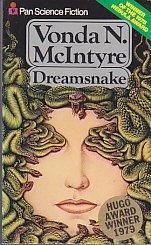Idioma English
Publicado el 22 de diciembre de 1979

Idioma English
Publicado el 22 de diciembre de 1979
Dreamsnake is a 1978 science fiction novel by American writer Vonda N. McIntyre. It is an expansion of her 1973 novelette "Of Mist, and Grass, and Sand", for which she won her first Nebula Award. The story is set on Earth after a nuclear holocaust. The central character, Snake, is a healer who uses genetically modified serpents to cure sickness—one snake is an alien "dreamsnake", whose venom gives dying people pleasant dreams. The novel follows Snake as she seeks to replace her dreamsnake after its death. The book is considered an example of second-wave feminism in science fiction. McIntyre subverted conventionally gendered narratives by rewriting a typical heroic quest to place a woman at its center, and by using devices such as avoiding gender pronouns to challenge expectations about characters' gender identities. Dreamsnake also explored varying social structures and sexual paradigms from a feminist perspective, and examined themes of healing …
Dreamsnake is a 1978 science fiction novel by American writer Vonda N. McIntyre. It is an expansion of her 1973 novelette "Of Mist, and Grass, and Sand", for which she won her first Nebula Award. The story is set on Earth after a nuclear holocaust. The central character, Snake, is a healer who uses genetically modified serpents to cure sickness—one snake is an alien "dreamsnake", whose venom gives dying people pleasant dreams. The novel follows Snake as she seeks to replace her dreamsnake after its death. The book is considered an example of second-wave feminism in science fiction. McIntyre subverted conventionally gendered narratives by rewriting a typical heroic quest to place a woman at its center, and by using devices such as avoiding gender pronouns to challenge expectations about characters' gender identities. Dreamsnake also explored varying social structures and sexual paradigms from a feminist perspective, and examined themes of healing and cross-cultural interaction. The novel was well-received, winning the 1978 Nebula Award, the 1979 Hugo Award, and the 1979 Locus Poll Award. The strength and self-sufficiency of Snake as a protagonist were noted by several commentators. Reviewers also praised McIntyre's writing and the book's themes. Scholar Diane Wood wrote that Dreamsnake demonstrated "science fiction's potential to produce aesthetic pleasure through experimentation with linguistic and cultural codes", and author Ursula K. Le Guin called it "a book like a mountain stream—fast, clean, clear, exciting, beautiful".